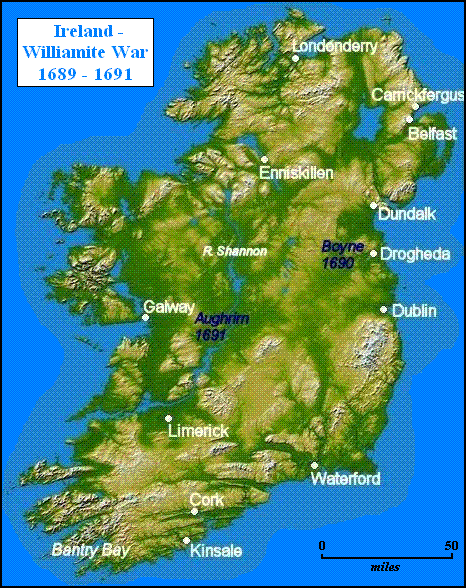The siege of Londonderry pressed to the brink of success. Then, under heavy fire, English boats break through to the town’s waterfront.
Continuing James II Invades Ireland,
our selection from The History of England by Tobias G. Smollott published in 1765. The selection is presented in four easy 5 minute installments. For works benefiting from the latest research see the “More information” section at the bottom of these pages.
Previously in James II Invades Ireland.
Time: 1690
Place: Londonderry, Ireland and the River Boyne, Ireland

At length a reinforcement arrived in the Lough, under the command of General Kirke, who had deserted his master, and been employed in the service of King William. He found means to convey intelligence to Walker that he had troops and provisions on board for their relief, but found it impracticable to sail up the river. He promised, however, that he would land a body of forces at the Inch, and endeavor to make a diversion in their favor, when joined by the troops at Inniskillen, which amounted to five thousand men, including two thousand cavalry. He said he expected six thousand men from England, where they were embarked before he set sail; he exhorted them to persevere in their courage and loyalty, and assured them that he would come to their relief at all hazards. The assurances enabled them to bear their miseries a little longer, though their numbers daily diminished. Major Baker dying, his place was filled by Colonel Michelburn, who now acted as colleague to Mr. Walker.
King James having returned to Dublin to be present at the Parliament, the command of his army devolved to the French general, Rosene, * who was exasperated by such an obstinate opposition by a handful of half-starved militia. He threatened to raze the town to its foundations and destroy the inhabitants without distinction of age or sex unless they would immediately submit themselves to their lawful sovereign. The governors treated his menaces with contempt, and published an order that no person, on pain of death, should talk of surrendering. They had now consumed the last remains of their provisions, and supported life by eating the flesh of horses, dogs, cats, rats, mice, and tallow, starch, and salted hides; and even this loathsome food began to fail. Rosene, finding them deaf to all his proposals, threatened to wreak his vengeance on all the Protestants of that county and drive them under the walls of Londonderry, where they should be suffered to perish by famine. The Bishop of Meath being informed of this design, complained to King James of the barbarous intention, entreating his majesty to prevent its being put into execution; that Prince assured him that he had already ordered Rosene to desist from such proceedings; nevertheless, the Frenchman executed his threats with the utmost rigor.
[* James was assisted in his attempt by a small body of French troops, England having entered the Grand Alliance against Louis XIV.–ED.]
Parties of dragoons were detached on this cruel service. After having stripped all the Protestants for thirty miles round, they drove these unhappy people before them like cattle, without even sparing the enfeebled old men, nurses with infants at their breasts, and tender children. About four thousand of these miserable objects were driven under the walls of Londonderry. This expedient, far from answering the purpose of Rosene, produced a quite contrary effect. The besieged were so exasperated at this act of inhumanity that they resolved to perish rather than submit to such a barbarian. They erected a gibbet in sight of the enemy, and sent a message to the French general importing that they would hang all the prisoners they had taken during the siege unless the Protestants whom they had driven under the walls should be immediately dismissed. This threat produced a negotiation, in consequence of which the Protestants were released after they had been detained three days without tasting food. Some hundreds died of famine or fatigue; and those who lived to return to their own habitations found them plundered and sacked by the papists, so that the greater number perished for want, or were murdered by straggling parties of the enemy. Yet these very people had for the most part obtained protection from King James, to which no respect was paid by his general.
The garrison of Londonderry was now reduced from seven thousand to five thousand seven hundred men, and these were driven to such extremity of distress that they began to talk of killing the popish inhabitants and feeding on their bodies. Kirke, who had hitherto lain inactive, ordered two ships laden with provisions to sail up the river, under convoy of the Dartmouth (frigate); one of these, called the Mountjoy, broke the enemy’s boom, and all the three–after having sustained a very hot fire from both sides of the river–arrived in safety at the town, to the inexpressible joy of the inhabitants.
The army of James was so dispirited by the success of this enterprise that they abandoned the siege in the night, and retired with precipitation, after having lost about nine thousand men before the place. Kirke no sooner took possession of the town than Walker was prevailed upon to embark for England, with an address of thanks from the inhabitants to their majesties for the seasonable relief they had received.
| <—Previous | Master List | Next—> |
Leave a Reply
You must be logged in to post a comment.